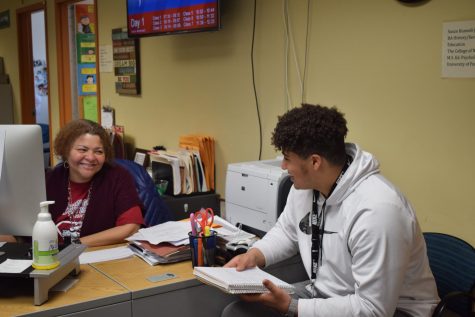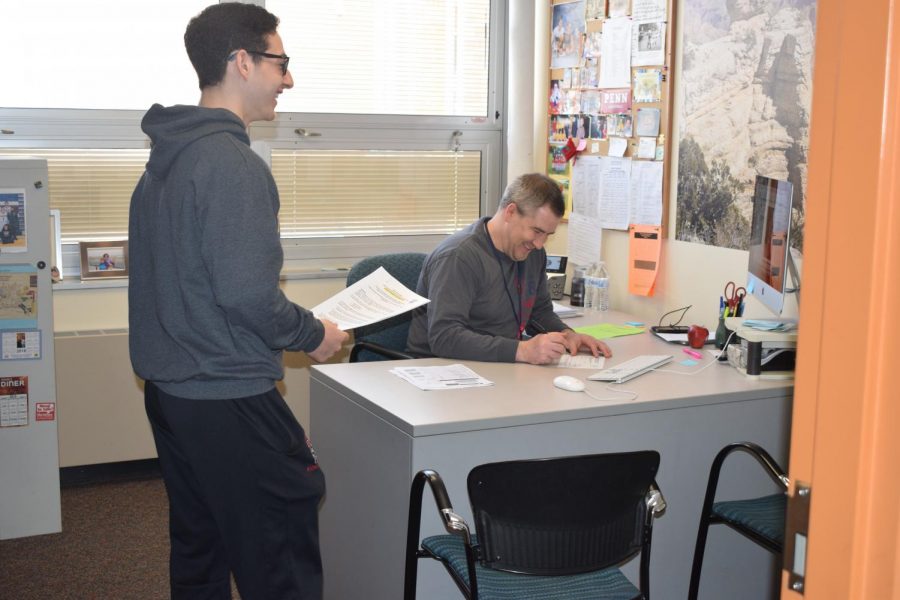Applying for college with the help of Guidance
Junior Isaac Fendrick shares a laugh with guidance counselor Mr. Crawford.
Mr. Anderson in Guidance knows that applying for college is stressful. “But it’s also exciting,” he said.
At this point in the year, seniors are now waiting, while the juniors will soon be applying.
For many students, applying for college starts early. According to guidance counselor Mr. Bolen, “Students start asking college questions freshman year.”
Starting freshman year, guidance will require kids to take personality tests and career tests on Naviance. By encouraging kids to use Naviance as freshmen, kids are becoming familiar with how the website works early on.
“Naviance does it all,” said supervisor of guidance Mr. Susko. Naviance is an online program that has everything you need to apply for college. “It keeps track of your GPA, test scores, class rank, and has training workshops. Using an individual student’s data plus previous students from Eastern’s data, Naviance gives you a good comparison of you and how you fit in with a college,” said Mr. Susko.
Guidance makes sure that every kid is getting help. “We are responsible for helping our set of students with the college application process,” said Mr. Anderson. “Starting in the spring of junior year, I sit down with all my juniors and give them an overview of the college process,” said Mr. Anderson. He also mentioned that all guidance counselors talk with their juniors, but each counselor does it differently.
Mr. Anderson said, “I talk with my juniors for a period and we discuss their plans for college and talk about when they are going on college visits.”
“I sit down with my juniors and discuss their interests, potential majors, price range of school, and location of school,” said Mr. Bolen.
In the spring of junior year and the fall of senior year, Guidance has a class meeting during lunch to give students an overview of the college process. Both talks go over the same info, because guidance wants to make sure every student is prepared for the college application process.
In the beginning of senior year, guidance counselors will have another talk with each of their students. During this talk each counselor helps each student develop a final list of schools, helps them start filling out applications, and answers any questions that a student may have.
“I will never tell a student not to apply to a school,” said Mr. Bolen. He added that “each year admissions offices change.”
“It is important to be realistic,” Mr. Anderson said, “but don’t be afraid to apply to a school.” It is stressed that you should apply to the college you want because you never know what will happen even if your chances seem slim.
When helping students develop a final list of colleges, counselors like to divide the list into three different sections: safety, target, and reach.
A safety school is a school that you will most likely be accepted. A target school is a school that is on par with your grades and test scores and that you have a good chance of being accepted. A reach school is a school that is out of your range score wise, but you still apply to because you have an outside chance of being accepted.
Guidance realizes that there is a lot of work that goes into applying to college. It offers several different help programs.
In January, guidance held a Junior College Planning Night. This program gave an overview of the entire application process along with a general rundown of the college process.
During the fall of senior year, students can can attend a college help program every Wednesday during lunch. This program takes place during both lunch A and lunch B in the computer lab (room 207). There are two guidance counselors in attendance that are there to answer any questions and to help students.
The guidance office is also a great resource. Guidance is always available if you have a question. “During the fall there is at least one student in the guidance office every day,” said Mr. Anderson.
Writing essays for college application is hard and stressful, but English teachers are there to help. During the summer, a select group of English teachers hold a college essay workshop. There are six different sessions that each run a week long from June to August. The workshop itself is ten hours total and cost $80 across the entire week.
“Some years we have up to 150 kids in attendance. The program is relaxed and we give tips on how to write a good essay and we provide feedback on the essay. Most students by the end of the week have a solid essay or two,” said Mr. Bowne who is one of the teachers who runs the workshops.
Morgan Lafferty, who played field hockey and was an editor for the Voyager during her time at Eastern, graduated in 2015 now studies Equine science at Delaware Valley University. She suggested asking your guidance counselor any questions you may have; don’t feel bad for asking too many questions or going into their office to discuss the college process too much. “Their job is to help you reach whatever goals you may have,” she said. “It’s a great resource to utilize.”

Senior Matt Claybrooks consults with secretary Kathryn Spinogatti.


